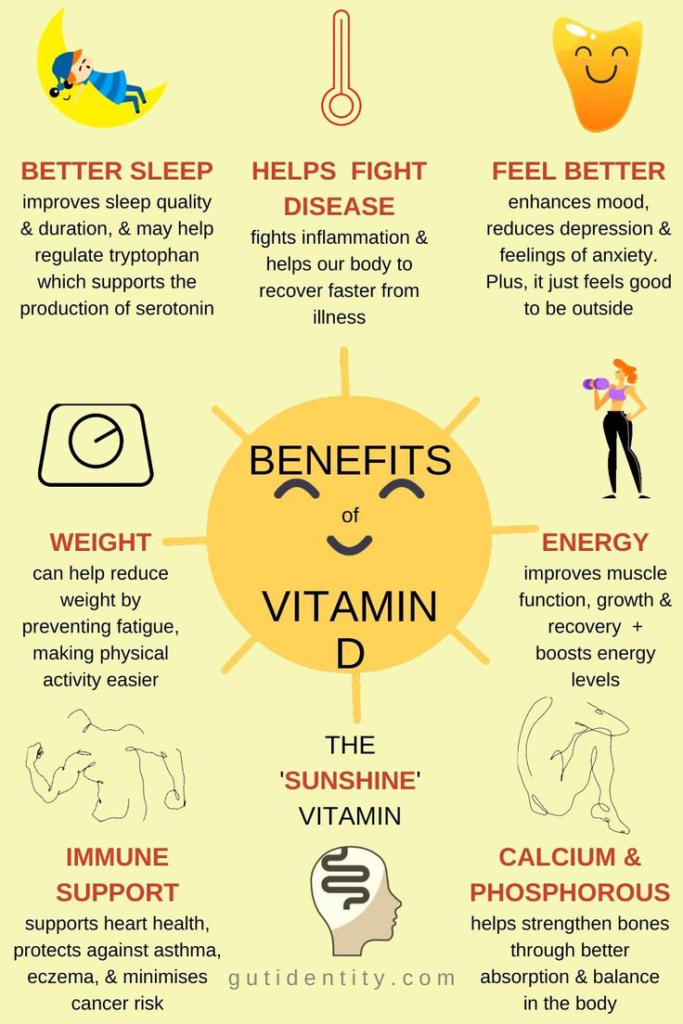
Vitamin D: The “Sunshine” vitamin!
A new research study at the University of Chicago Medicine has found that when it comes to Flu or Covid, having vitamin D levels above those traditionally considered sufficient may lower the risk of infection.
Get out for lunch!
We all need to spend more time exposed to sunlight but it’s the UVB rays that we’re really interested in as these make vitamin D. These rays are best absorbed between 11am and 2pm when the sun is at its highest. Just 10 to 20 minutes per days generates sufficient vitamin D.
Vitamin D insufficiency affects almost 50% of the population worldwide. An estimated 1 billion people worldwide, across all ethnicities and age groups, have a vitamin D deficiency (VDD). This pandemic of hypovitaminosis D can mainly be attributed to lifestyle (for example, reduced outdoor activities) and environmental (for example, air pollution) factors that reduce exposure to sunlight, which is required for ultraviolet-B (UVB)-induced vitamin D production in the skin. High prevalence of vitamin D insufficiency is a particularly important public health issue because hypovitaminosis D is an independent risk factor for total mortality in the general population. Current studies suggest that we may need more vitamin D than presently recommended to prevent chronic disease. As the number of people with VDD continues to increase, the importance of this hormone in overall health and the prevention of chronic diseases are at the forefront of research. VDD is very common in all age groups.
Food on Campus
Buenos Diaz Coffee
Now open! The espresso stand in the Parks Student Union serves coffee, other beverages, grab-and-go salads and sandwiches. It is operated by Buenos Diaz Coffee Co.
Hours:
7:30 a.m. to 6 p.m. Monday-Thursday
7:30 a.m. to 2 p.m. Friday (closed Fridays during the Summer)
Bookstore
The bookstore located on the Parks Student Union main floor sells snacks, beverages and grab-and-go items. See webpage for hours.
Parks Cafe
The cafe on the Parks Student Union main floor is closed for food service, but the airy cafeteria with large windows and seating for more than 300 is open. Microwaves are available for student use.
There are also a number of nearby places that offer food, including Starbucks, Taco-Book, Umami (poke, sushi burritos, and tea), Sunny Teriyaki, and 7-Eleven.
Save the date!
EvCC Sustainability Sponsored FREE Electronics Recycling Event 11/15/2023
3R Technology will be on campus providing FREE electronics recycling in Lot F (next to the large recycle dumpster) on Wednesday , November 15th 2023 from 10am to 2pm.
Accepted electronics list available here: https://3rtechnology.com/materials-accepted/
Students for Enviromental Action (SEA) invites you to be an environmental hero! Bring clean styrofoam, packing peanuts in bags or boxes, bubble wrap and plastic film to be recycled–for FREE! Parking Lot F
November 15th 10am-2pm
Here is a list of items accepted: https://docs.google.com/document/d/1d7sVx0BNARgqt_Tj0aOTvitlW7hiTihpoy4ecG_fMw4/edit?usp=sharing
Learn more about EvCC Sustainability! www.everettcc.edu/green
Mariya Zelenskyy – Media and Outreach Coordinator sustainability@everettcc.edu









